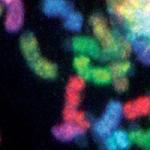
Xiaoling Li, Ph.D.
Senior Investigator
Signal Transduction Laboratory / Metabolism, Genes, and Environment Group
NIEHS
Research Topics
The long-term goal of the Metabolism, Genes, and Environment Group is to understand the signal transduction that coordinates the gene-environment interaction in biological processes associated with metabolic homeostasis, and investigate how dysregulation of this interplay contributes to pathogenesis of metabolic diseases and aging. To achieve this goal, the group focuses on a family of unique protein modification enzymes called sirtuins. Sirtuins are a highly conserved family of NAD+-dependent protein deacetylases and/or ADP-ribosyltransferases that target histones, transcription factors, co-factors, as well as numerous other key regulators. The NAD+-dependent activities enable sirtuins to monitor cellular energy status and modulate gene transcription, energy metabolism, and genome stability in response to environmental signals. These activities are also important for cell survival in response to various environmental stressors and are required for lifespan extension provided by calorie restriction (CR) in a number of model organisms. Therefore, sirtuins are considered to be essential genetic factors that directly link the environment to animal physiology, providing us a unique opportunity to study gene-environment interactions during the processes of disease and aging.
The mammalian genome consists of seven sirtuins, collectively known as SIRT1 to SIRT7. They are expressed in different tissues with distinct subcellular localizations. The laboratory focuses on SIRT1, the most conserved mammalian sirtuin. Using mouse and cultured cells as model systems, the group combines molecular, cellular, and genetic approaches to study the role of SIRT1 in the regulation of metabolism, stress response, reproduction, and ultimately aging.
Here are some areas of research: (1) The role of SIRT1 in transcriptional responses, particularly nuclear receptor mediated signaling; (2) The role of SIRT1 in metabolic diseases associated with aging; (3) The regulation of SIRT1's activity in response to various environmental, nutritional, and hormonal cues.
Biography
Xiaoling Li, Ph.D., heads the Metabolism, Genes, and Environment Group within the Laboratory of Signal Transduction (LST) of National Institute of Environmental Health Sciences (NIEHS). She received her Bachelor degree in Biochemistry from Peking University in China in 1994, her Master degree in Molecular Biology from Institute of Biophysics of Chinese Academy of Sciences in 1997, and her Ph.D. in Biological Chemistry from the Johns Hopkins School of Medicine in 2002. She was a Leukemia & Lymphoma Society postdoctoral fellow in the laboratory of Leonard Guarente at Massachusetts Institute of Technology before joining NIEHS in 2007.
Selected Publications
- Ji M, Xu X, Xu Q, Hsiao YC, Martin C, Ukraintseva S, Popov V, Arbeev KG, Randall TA, Wu X, Garcia-Peterson LM, Liu J, Xu X, Andrea Azcarate-Peril M, Wan Y, Yashin AI, Anantharaman K, Lu K, Li JL, Shats I, Li X. Methionine restriction-induced sulfur deficiency impairs antitumour immunity partially through gut microbiota. Nat Metab. 2023.
- Fang Y, Xu X, Ding J, Yang L, Doan MT, Karmaus PWF, Snyder NW, Zhao Y, Li JL, Li X. Histone crotonylation promotes mesoendodermal commitment of human embryonic stem cells. Cell Stem Cell. 2021;28(4):748-763.e7.
- Shats I, Williams JG, Liu J, Makarov MV, Wu X, Lih FB, Deterding LJ, Lim C, Xu X, Randall TA, Lee E, Li W, Fan W, Li JL, Sokolsky M, Kabanov AV, Li L, Migaud ME, Locasale JW, Li X. Bacteria Boost Mammalian Host NAD Metabolism by Engaging the Deamidated Biosynthesis Pathway. Cell Metab. 2020;31(3):564-579.e7.
- Fan W, Tang S, Fan X, Fang Y, Xu X, Li L, Xu J, Li JL, Wang Z, Li X. SIRT1 regulates sphingolipid metabolism and neural differentiation of mouse embryonic stem cells through c-Myc-SMPDL3B. Elife. 2021;10.
- Xu Q, Li Y, Gao X, Kang K, Williams JG, Tong L, Liu J, Ji M, Deterding LJ, Tong X, Locasale JW, Li L, Shats I, Li X. HNF4α regulates sulfur amino acid metabolism and confers sensitivity to methionine restriction in liver cancer. Nat Commun. 2020;11(1):3978.
Related Scientific Focus Areas

Molecular Biology and Biochemistry
View additional Principal Investigators in Molecular Biology and Biochemistry




This page was last updated on Friday, April 12, 2013